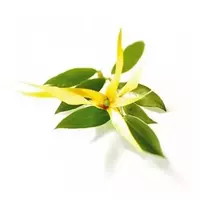Ylang-ylang flowers

Cananga fragrant (Cananga odorata) or Ylang-ylang is a species of flowering monotypic plant that belongs to the Annonovae family. The original name of the ylang-ylang flowers was given due to its original and distinctive shape, somewhat reminiscent of the beautiful and bright butterfly that live in the rainforest. In literal translation from the Philippine language, the name of the ylang-ylang flowers is translated as fluttering. Due to its unique useful properties, ylang-ylang is called in Asia nothing more than a "flower of all flowers. "
Since ancient times, both ylang-ylang flowers and vegetable oil, which is derived from the plant, have been in steady demand and popularity in Asian countries. The birthplace of the ylang-ylang plant is considered to be the Philippines. In addition, in the wild or in the natural habitat, ylang-ylang flowers can be found in the forests of Burma, Java and Kalimantan islands in Indonesia. The plant is currently cultivated in the vast majority of countries in the Asian region. It is noteworthy that ilang-ilang flowers are used in heraldry, for example the coat of arms of Mayotte or the flag of the Northern Mariana Islands.
Ylang-ylang or kananga is an evergreen plant that does not exceed 40 meters in height. The distinctive characteristics and properties of ylang-ylang are used in cooking, usually as a flavor. Ylang-ylang flowers are distinguished by their rich aroma, which resembles the smell of neroli, as well as jasmine. Usually, ylang-ylang flowers are dried or processed for vegetable oil. Most often, dried ylang-ylang flowers are used as a fragrance in teas.
In addition, ylang-ylang flowers are used in the production of confectionery, sweets and drinks. In China, ylang-ylang petals are used to make healing tea or infusion. To prepare such an infusion, you need to pour only one petal of the ylang-ylang flower with a liter of hot water. An infusion made with ylang-ylang flowers helps calm the nervous system of the human body and normalize blood pressure.
In folk Asian medicine, an essential oil made of ylang-ylang petals occupies a special place. Often, ylang-ylang oil is used in aromatherapy, since the product helps a person relax and tune into a positive mood. Ylang-ylang plays a huge role for the cosmetics industry. The distinctive aromatic characteristics of the plant open up a wide range of opportunities for manufacturers of both cosmetic products and perfumes.
Ylang-ylang essential oil helps to significantly improve the skin of the face and body. Ylang-ylang-based cosmetics are valued for truly miraculous results. The active components included in the ilang-ilang petals help improve blood circulation, increase skin tone, and also prevent the formation of "early" wrinkles.
Ylang-ylang refers to sacred plants in Indonesia. The ancient Indonesian custom says that no wedding ceremony can do without ylang-ylang flowers, with the help of which a sacred ceremony is held, which will help newlyweds to preserve happiness and harmony in family life.
ylang-ylang flowers 0.1 kCal
Energy value of ylang-ylang flowers (Ratio of proteins, fats, carbohydrates - ju):
Proteins: 0 g (~ 0 kCal)
Fats: 0 g (~ 0 kCal)
Carbohydrates: 0 g (~ 0 kCal)
Energy ratio (b | y): 0% | 0% | 0%
 Español
Español Français
Français Português
Português Русский
Русский 简体中文
简体中文 繁體中文
繁體中文 日本語
日本語 한국어
한국어 العربية
العربية Türkçe
Türkçe Қазақ
Қазақ Deutsch
Deutsch Italiano
Italiano Українська
Українська
